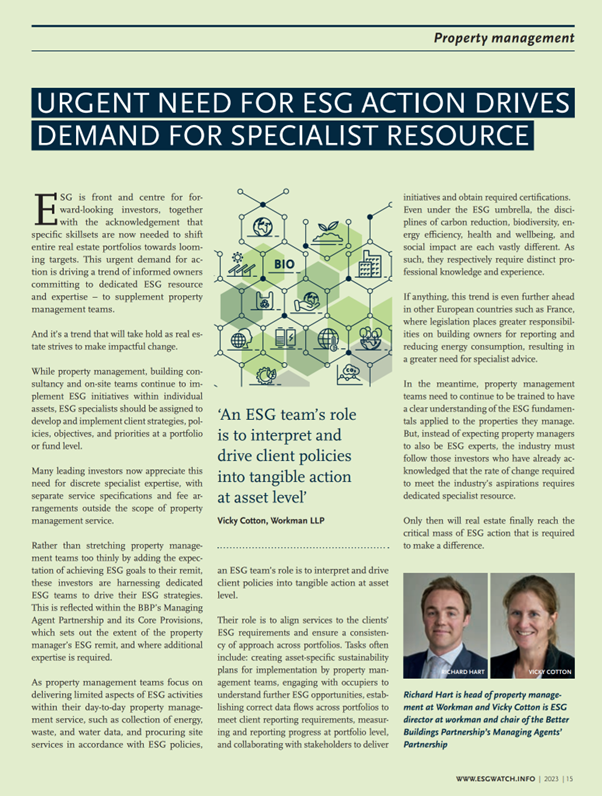Urgent need for ESG action drives demand for specialist resource
Enlightened investors are committing to specialist ESG expertise to bolster property management teams. Richard Hart, Head of Property Management at Workman and Vicky Cotton, ESG Director at Workman and Chair of the Better Buildings Partnership’s Managing Agents’ Partnership, write in Property EU’s ESG Watch.
ESG is front and centre for forward-looking investors, together with the acknowledgement that specific skillsets are now needed to shift entire real estate portfolios towards looming targets. This urgent demand for action is driving a trend of informed owners committing to dedicated ESG resource and expertise – to supplement property management teams.
And it’s a trend that will take hold as real estate strives to make impactful change.
While property management, building consultancy and on-site teams continue to implement ESG initiatives within individual assets, ESG specialists should be assigned to develop and implement client strategies, policies, objectives, and priorities at a portfolio or fund level.
Many leading investors now appreciate this need for discrete specialist expertise, with separate service specifications and fee arrangements outside the scope of property management service.
Rather than stretching property management teams too thinly by adding the expectation of achieving ESG goals to their remit, these investors are harnessing dedicated ESG teams to drive their ESG strategies. This is reflected within the BBP’s Managing Agent Partnership and its Core Provisions, which sets out the extent of the property manager’s ESG remit, and where additional expertise is required.
“An ESG team’s role is to interpret and drive client policies into tangible action at asset level.”
As property management teams focus on delivering limited aspects of ESG activities within their day-to-day property management service, such as collection of energy, waste, and water data, and procuring site services in accordance with ESG policies, an ESG team’s role is to interpret and drive client policies into tangible action at asset level.
Their role is to align services to the clients’ ESG requirements and ensure a consistency of approach across portfolios. Tasks often include; creating asset-specific sustainability plans for implementation by property management teams, engaging with occupiers to understand further ESG opportunities, establishing correct data flows across portfolios to meet client reporting requirements, measuring and reporting progress at portfolio level, and collaborating with stakeholders to deliver initiatives and obtain required certifications.
Even under the ESG umbrella, the disciplines of carbon reduction, biodiversity, energy efficiency, health and wellbeing, and social impact are each vastly different. As such, they respectively require distinct professional knowledge and experience.
If anything, this trend is even further ahead in other European countries such as France, where legislation places greater responsibilities on building owners for reporting and reducing energy consumption, resulting in a greater need for specialist advice.
In the meantime, property management teams need to continue to be trained to have a clear understanding of the ESG fundamentals applied to the properties they manage. But, instead of expecting property managers to also be ESG experts, the industry must follow those investors who have already acknowledged that the rate of change required to meet the industry’s aspirations requires dedicated specialist resource.
Only then will real estate finally reach the critical mass of ESG action that’s required to make a difference.
See Property EU‘s full ESG Watch supplement.




